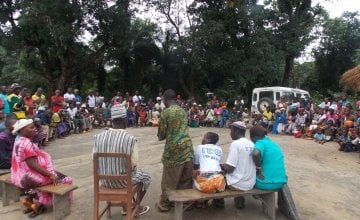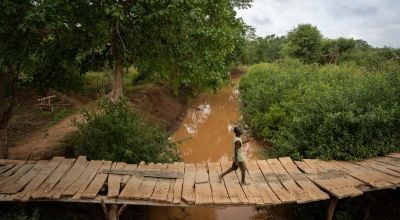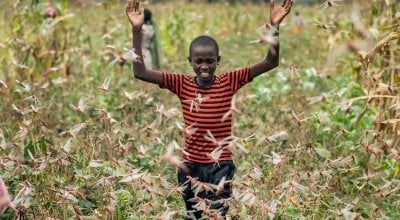
Read our 2024 annual report

Knowledge Hub
In Ireland and abroad, HIV prevention efforts must be accelerated

Following Irish AIDS Day earlier this month, the Health Protection Surveillance Centre has confirmed that there have been 239 new cases of HIV diagnosed in Ireland this year. Concern’s Global Health & HIV and AIDS Programme Adviser Breda Gahan explains why this issue remains as important as ever.
Stark statistics
Last year saw an 8% increase in the number of reported cases of HIV in Ireland, with 528 notifications of the disease. Of these, 79% (417) were among males.
HIV prevention is failing, it just hasn’t been invested in, despite the increasing number of infections.
We also need to make services more adolescent and user friendly. As a nurse, I would go as far to say that it’s too late to educate kids at secondary school level. Hormones are hopping at that age.
We should be informing kids in primary school in an age appropriate way, I think around the age of 10 to 12 years.
Globally, women and girls make up more than half of the 36.9 million people living with HIV (19.1 million) and every day, around 1,000 young women between the ages of 15 and 24 years become infected.
Locally and globally, it is evident that HIV prevention efforts need to be resourced and accelerated. Over nine million people globally do not know they are living with HIV. They have not been tested and are not on treatment, increasing their vulnerability to other infections and the risk of unintentionally spreading the virus to others.
Only people who have tested for HIV and received their results can be supported to access treatment if they are found to be HIV positive. There is still no cure for AIDS, but many people live positively with HIV and respond well to anti-retroviral treatment (ART). This means the level of the virus has fallen so low that it cannot be detected and the person cannot pass on the virus.
Globally, however, only 47% of all people living with HIV are virally suppressed due to treatment access and quality issues.
Our efforts to tackle HIV
Concern Worldwide works to help reduce HIV risk and vulnerability among target populations in all countries where we work.
Education programmes, delivered to children and young people in an age-appropriate manner, are especially important for HIV prevention efforts so we work with ministries of education, local organisations in schools and with out-of-school youths.
The health sector is essential for HIV testing and treatment. Health system strengthening efforts, funded by Irish Aid, UK Aid, USAID, the European Commission and other donors, build stronger systems to help sustain treatment for people living with HIV for life.
The impact of HIV and AIDS is greatest on those who have not been tested and are not on treatment. These are often the poorest and most marginalised people.
Efforts improving worldwide
In Sierra Leone, Concern set up a support programme for people living with HIV as part of a wider Ebola response. This was funded by Irish Aid in 2016.
The Concern partnership with Grassroots Soccer led the adaptation of the HIV and life skills curriculum (SKILLZ) for use in Malawi. This was a success, with reach further extended and enhanced through our partners in Malawi.
It was reported in final evaluation that a number of traditional or cultural-based beliefs and practices that negatively impact on women of childbearing age appear to be shifting. These include the idea of ‘couple’ HIV and STI testing and letting women knowing they have the right to ask men to have a STI and HIV test.
The Kenya Child Survival Programme evaluation reported that the Community Birth Referral Agents were happy in their new roles and on their HIV learning.
A final evaluation of Feed the Future Ethiopia Innovative Potato Activities Project in South Wollo Zone reported that the project gave due consideration for the needy households and cross-cutting issues including HIV and AIDS and child rights were included as agenda items.
Brochures on topics including gender, HIV and AIDS were produced and distributed to Kebele offices, the beneficiary community and implementing partners to increase local understanding on HIV and particularly for HIV prevention.

Last year, in Bangladesh, Burundi and in Sudan, our teams and partners have responded to HIV and AIDS through targeted awareness raising, messaging, outreach sessions and HIV prevention education.
In the Burundi Graduation programme, 14 community outreach sessions on HIV, family planning and family-related laws were conducted. In the Youth Livelihoods Programme, training sessions included HIV, AIDS and family planning topics.
Working in partnership with Sonke Gender Justice, Concern Kenya HIV response is within the Governance, Advocacy and Education programmes. In Nairobi, 23% of girls and 41.1% of boys aged between 10 and 14 reported in a survey that they had engaged in high-risk behaviour and yet only 60.1% of girls and 60.5% of boys in this age group can correctly identify two ways of preventing sexual transmission of HIV.
With a national HIV adult prevalence rate of 4.8%, an accelerated and ongoing response to this epidemic is essential in Kenya and beyond. Concern Liberia and South Sudan teams also supported national World AIDS Day events last December, aiming to increase HIV education for prevention which can be life-saving.
We must do more
34% of young men and 28% of young women in sub-Saharan Africa had a basic knowledge of how to protect themselves from HIV.
HIV and AIDS has ended many lives and destroyed livelihoods. It continues to harm people from Afghanistan to South Sudan and can thwart efforts improve lives with poorest people. If HIV is not stopped, the world will not reach all the Sustainable Development Goal targets by 2030.
HIV is preventable everywhere and in Ireland, we must do more to stop the spread of HIV locally and globally and lead by example.
Follow Breda on Twitter
Breda Gahan is Concern’s Global Health and HIV and AIDS Programme Adviser. She began working in HIV and AIDS as a nurse in St James’s Hospital in Dublin and has over 30 years of experience working with Concern overseas.





